A Great Big Pile of Books
The title generator has finally given up the ghost! Metaphor, snark and dubious pun stocks are at an all time low! Dig for victory!
Sooo much to cram into this podcast, so very brief nod to Octocon in Dublin, which was great fun and highly recommended. Maura McHugh and Emma Newman were superb GoH's, the Vault of Horror is truly, wonderfully horrible, and there was the very pleasant sideline of hearing not-yet-announceable good news from friends, which given how brutal the publishing industry is right now is always welcome. The only downside was that the cheapish hotel I stayed at turned out to be cheapish because it was next to a nightclub, and so of sleep there was none, and even less than none because Dublin was pretty damn happy to have beaten Germany at home and wanted to make sure that I was fully appraised of this.
So this is one of my book-recommending posts, but it shall be split into two halves, and the number of its halves shall be two (1). Firstly, some books what I have read and enjoyed, secondly some books what happen to be up for the British Fantasy Award. The latter now have their own post, immediately after this one, because I was being waaaay too stingy with space.
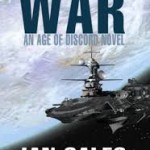
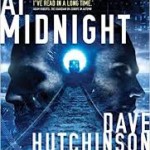 First up, Age of Scorpio by Gavin Smith, which is a very fast-paced super-high-tech space opera set in a post-human far future where only uplifted animal species (hybrids?) survive. At the same time another third of the plot takes place in Bronze Age Britain and another third in a grimy near future, all three concerning a fight over ancient alien tech and a mysterious coccoon. It is extremely violent — especially in the future sections which have entire planets as collateral damage — and that is something of an acquired taste, but I very much liked the split between time zones, and also the character of Vic, an eight feet tall sweary insect space marine. Also in the space opera vein I have also recently read Ian Sales' Prospect of War. Sales is best known for his very hard SF, and it's fascinating to see him turn his talents to something very different here — far more of a straight up military/spycraft SF, complete with navies and Dune-style noble houses. I particularly liked his space combat, where the science and the fiction met in a very smooth partnership.
First up, Age of Scorpio by Gavin Smith, which is a very fast-paced super-high-tech space opera set in a post-human far future where only uplifted animal species (hybrids?) survive. At the same time another third of the plot takes place in Bronze Age Britain and another third in a grimy near future, all three concerning a fight over ancient alien tech and a mysterious coccoon. It is extremely violent — especially in the future sections which have entire planets as collateral damage — and that is something of an acquired taste, but I very much liked the split between time zones, and also the character of Vic, an eight feet tall sweary insect space marine. Also in the space opera vein I have also recently read Ian Sales' Prospect of War. Sales is best known for his very hard SF, and it's fascinating to see him turn his talents to something very different here — far more of a straight up military/spycraft SF, complete with navies and Dune-style noble houses. I particularly liked his space combat, where the science and the fiction met in a very smooth partnership.
Next is Dave Hutchinson's Europe at Midnight. I have already waxed on the previous volume, the superb Europe in Autumn, in a previous post, and I liked it very much. Midnight is Hutchinson actually upping his game, with some top notch Cold War style spy action and some reveals about the Big Secret Stuff you learn at the end of Autumn. I can't really say more without spoilers — and you won't want this one spoiled. but it is superb. Autumn came within a whisker of awards this year. Midnight looks to be a strong contender for next.
Another book I've previously recommended is Sophia MacDougall's Mars Evacuees, which is a superb mid-grade/young adult SF story with better S than a lot of adult science fiction. The sequel, Space Hostages, is now out, and is another excellent read — more alien cultures, more space peril, more robot goldfish, and more incisive commentary on the modern world through the lens of SF.
I met Clifford Beal at Fantasycon in 2014 but have been very remiss in not getting round to reading his work until now. I had the pleasure of an advance copy of The Raven's Banquet out of Nine Worlds, and was finally able to put that right. Beal writes historical fiction very much in the same way as Cornwell does with his Arthur books — right on the border between straight history and fantastic history — whether there is a supernatural or purely a psychological element to what's going on is up to the reader. Clifford writes extremely well — swift and elegant prose about complex and believable characters.
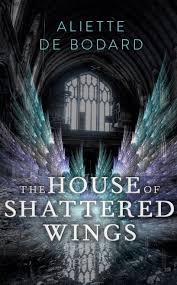 Aliette de Bodard's House of Shattered Wings is another recent acquisition. I've been looking forward to this one ever since I heard about it, and it didn't disappoint (also: my favourite cover of this year from Teddy Eduardo Iglesias/Shadoweddancer). The setting is Paris after the Great War, only the Great War was a magical one that has left the city an utter ruin, familiar landmarks picked over by gangs and monsters, or dominated by ragged noble houses led mostly by fallen angels. There is a lot said about imperialism (French, specifically — one character is a Vietnamese soldier dragged to Europe to fight, then abandoned) and the use and abuse of power, and every character (all beautifully realised) lives a daily round of terrible choices and conflicting loyalties. This is, straight up, a wonderful book, a really original fantasy marvellously realised. Another for the awards lists, methinks.
Aliette de Bodard's House of Shattered Wings is another recent acquisition. I've been looking forward to this one ever since I heard about it, and it didn't disappoint (also: my favourite cover of this year from Teddy Eduardo Iglesias/Shadoweddancer). The setting is Paris after the Great War, only the Great War was a magical one that has left the city an utter ruin, familiar landmarks picked over by gangs and monsters, or dominated by ragged noble houses led mostly by fallen angels. There is a lot said about imperialism (French, specifically — one character is a Vietnamese soldier dragged to Europe to fight, then abandoned) and the use and abuse of power, and every character (all beautifully realised) lives a daily round of terrible choices and conflicting loyalties. This is, straight up, a wonderful book, a really original fantasy marvellously realised. Another for the awards lists, methinks.
Last in this list, a new release from one of my all time favourite authors, Frances Hardinge. Her new book is The Lie Tree, and I read it practically in a single sitting. The setting is the Victorian age, and the young heroine Faith is the daughter of a clergyman natural historian of some renown, who abruptly uproots (sorry) his entire family to a remove island for… reasons. There is a murder mystery, and there is a profoundly biting social commentary centring about the gap between Faith's ambitions to be a scientist and the entire world's expectation that she will be seen, not heard, and thereafter disposed of by way of marriage. And there is the titular Lie Tree, a bizarre piece of gothic creepiness that grows through the plot literally and thematically. I am not doing the book justice, frankly. It is very funny, where it needs to be; it is grippingly tense; it is terribly, terribly sad — more emotionally affecting than anything else I've read in a long time. Hardinge is another writer more than familiar with shortlists and this deserves to be seen on them.
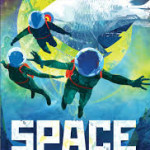
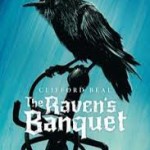
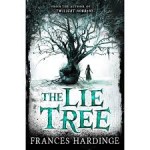 (1) the quantity of sheer nonsense in this post is indicative of the hurry with which I am writing it.
(1) the quantity of sheer nonsense in this post is indicative of the hurry with which I am writing it.
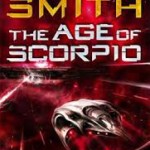
 © 2008-2025 Pan Macmillan
© 2008-2025 Pan Macmillan
Thank you very much — that#s my Christmas book list sorted.